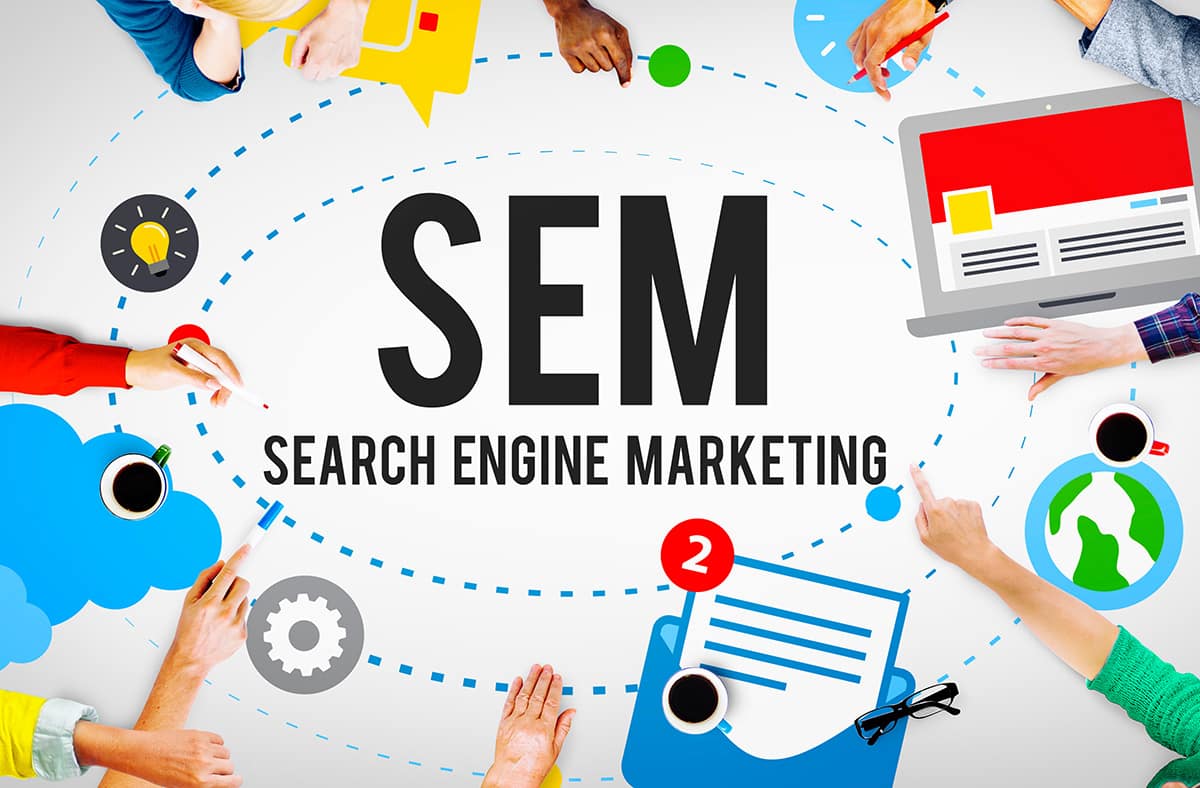In today’s digital age, businesses are constantly seeking ways to increase their visibility online, drive traffic to their websites, and ultimately, boost sales. One effective method to achieve this is Search Engine Marketing (SEM). If you’re unfamiliar with SEM or looking to deepen your knowledge, this guide is for you. We will cover the definition of SEM, its types, examples, advantages, and its significance in the business world.


Search Engine Marketing Definition
Search Engine Marketing, often abbreviated as SEM, is a form of digital marketing that involves promoting websites by increasing their visibility on search engine results pages (SERPs) through paid advertisements. The most common platform used for SEM is Google Ads, but SEM can also apply to other search engines like Bing or Yahoo.
SEM involves bidding on keywords that are relevant to your business. When someone types a search query that matches the keywords you’ve bid on, your ad can appear at the top or bottom of the search results. SEM is a pay-per-click (PPC) model, meaning you pay only when someone clicks on your ad.
Types of Search Engine Marketing
There are two main types of Search Engine Marketing strategies: Paid Search Ads and Search Engine Optimization (SEO).
- Paid Search Ads (PPC): Paid search ads are advertisements that appear on search engine results pages when users search for specific keywords. These are the ads that often appear at the top of Google’s results, marked with a small “Ad” label. PPC ads can drive instant traffic to your site, but you need to budget for each click, making this a more short-term strategy compared to organic methods.
- Search Engine Optimization (SEO): Although SEO is often discussed as a separate discipline from SEM, it can be considered a part of the broader search engine marketing umbrella. SEO focuses on optimizing a website to rank higher organically on SERPs. While it doesn’t involve paid ads, SEO is crucial to SEM strategies because it helps establish long-term visibility through organic searches.
Search Engine Marketing Examples
To give you a better idea of how SEM works in practice, let’s look at some common examples:
- Google Ads Campaign: A local bakery bidding on keywords like “best bakery in [city]” to show ads to users who are searching for baked goods in their area. Their ad appears at the top of the search results, increasing their chances of being clicked.
- Product Listing Ads (PLAs): These are often seen in eCommerce, where retailers showcase products along with images, prices, and a short description directly on the search engine result pages. For example, a search for “running shoes” will show several ads from different sellers at the top of Google, each displaying a product image and price.
- Remarketing Ads: These ads target users who have already visited your website but didn’t make a purchase. By bidding on keywords related to your product or service, you can show them your ad again when they continue their search, which increases the likelihood of conversion.
Search Engine Marketing Advantages
SEM offers numerous benefits for businesses, making it a powerful marketing tool:
- Instant Results: Unlike SEO, which can take months to show results, SEM allows you to place your ad in front of potential customers immediately. As soon as your campaign goes live, your ad can start appearing at the top of the search results, bringing quick visibility.
- Targeted Advertising: SEM allows you to bid on specific keywords, ensuring that your ads are shown to people searching for products or services similar to yours. You can also filter your audience based on location, device, or other demographic data.
- Cost-Effective: Since SEM operates on a PPC model, you only pay when someone clicks on your ad. This makes it a cost-effective way to ensure you’re not paying for impressions that don’t lead to website visits.
- Measurable Data: SEM platforms provide detailed analytics and metrics. You can track impressions, clicks, conversion rates, and even return on investment (ROI), allowing you to optimize campaigns based on performance.
- Brand Awareness: Even if users don’t click on your ad, seeing your business name in the top search results increases brand visibility. This can create more recognition over time, leading to future customer engagement.
Importance of Search Engine Marketing
SEM is essential for any business looking to establish a strong online presence. Here’s why:
- Competing in the Digital Space: In a crowded marketplace, SEM ensures that your brand is seen by the right people at the right time. With millions of searches happening every day, SEM provides an opportunity to capture a portion of the traffic that may otherwise go to competitors.
- Boosting Sales and Leads: Since SEM targets people actively searching for products or services like yours, it can have a direct impact on generating sales and leads. SEM allows you to show up at the precise moment a user is looking for what you offer.
- Reaching Mobile Users: With the increase in mobile searches, SEM can ensure your ads are optimized for mobile devices, giving you the chance to connect with people on the go.
- Enhancing Local Search: SEM can be particularly useful for businesses that rely on local customers. By focusing on local keywords and targeting specific geographic locations, you can make sure that your ads are reaching customers in your area.


Search Engine Marketing Analyst
A Search Engine Marketing Analyst is a professional responsible for managing and optimizing SEM campaigns to maximize performance. Their role involves:
- Conducting keyword research to identify the best terms to target for paid search ads.
- Monitoring and analyzing campaign performance using tools like Google Analytics.
- Adjusting bids and budgets to improve ad placements and reduce cost-per-click (CPC).
- Creating and testing ad copy to increase click-through rates (CTR).
- Analyzing competitors’ SEM strategies and identifying areas of improvement.
- Reporting on campaign success and providing recommendations for future efforts.
Having a skilled SEM analyst can significantly enhance the performance of your campaigns, ensuring you get the best results from your investment.
Frequently Asked Question
What’s the difference between SEO and SEM?
SEO focuses on organic (non-paid) search engine rankings, while SEM includes paid advertising like PPC. SEO builds long-term visibility, whereas SEM provides immediate, paid results.
What is the search engine market?
The search engine market refers to the platforms where users search for information online, including Google, Bing, Yahoo, and others, with Google holding the largest share.
Which is paid, SEO or SEM?
SEM is paid, involving pay-per-click (PPC) ads. SEO is organic and doesn’t require payment for placement.
Why is SEM important?
SEM provides immediate visibility, allowing businesses to quickly drive traffic to their website and target specific audiences with paid ads.
Which is a benefit of SEM?
A key benefit of SEM is instant traffic, along with the ability to measure and optimize campaigns in real time using detailed analytics.


